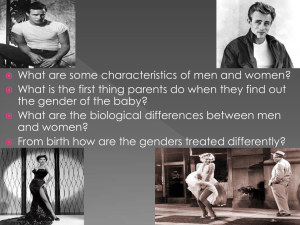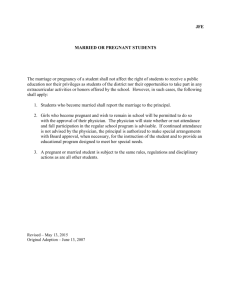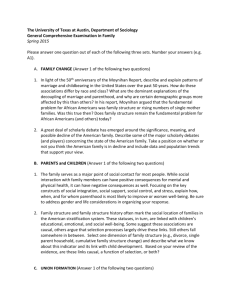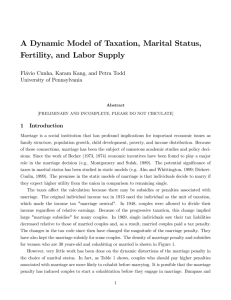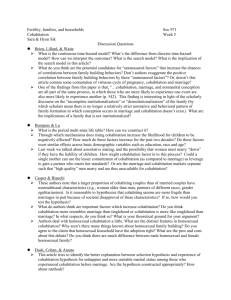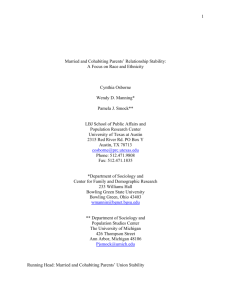Outline
advertisement
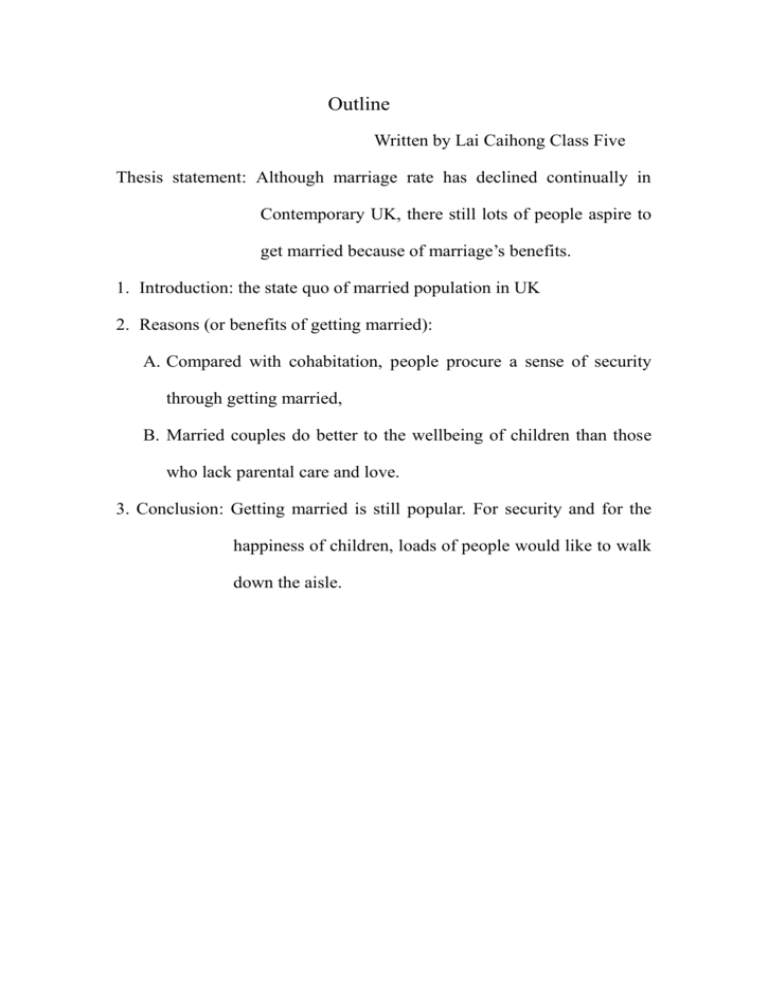
Outline Written by Lai Caihong Class Five Thesis statement: Although marriage rate has declined continually in Contemporary UK, there still lots of people aspire to get married because of marriage’s benefits. 1. Introduction: the state quo of married population in UK 2. Reasons (or benefits of getting married): A. Compared with cohabitation, people procure a sense of security through getting married, B. Married couples do better to the wellbeing of children than those who lack parental care and love. 3. Conclusion: Getting married is still popular. For security and for the happiness of children, loads of people would like to walk down the aisle. In decline — but still popular: A view on Marriage in Contemporary UK Despite the marriage rate is decreasing and the divorce rate is increasing, there still lots of people aspire to get married. In a Mori poll that asked people what lifestyle they would prefer, 68% opted for being married with children. Only 4% said they wanted to be unmarried with children. The graph (see graph1) at though the first marriage rate is decreasing sharply since 1973, the rate of remarriage is increasing steadily at the same time. In a word, although marriage is seemed outdated in many people’s eyes, still there are quantities of people opting to get married because of its benefits. Graph1 Marriages, United Kingdom, 1950 - 2005 Sources: Office for National Statistics, General Register Office for Scotland, Northern Ireland Statistics and Research Agency. “A man may have a quarrel to marry, when he will.” said Bacon in his essay “Of Marriage and Single Life.” So what are the reasons for people in contemporary UK to choose to get married? First of all, marriage provides those who get married a sense of security. To get married means to seal or cement the relationship. When people marry, they commit themselves not only to being emotional and sexual partners, but also to taking care of each other-for richer or for poorer, in sickness and in health. They promise to stick by each other through the ups and downs that occur in everyone's lives. This promise and the trust it builds encourage partners to make sacrifices for the good of the family. In recent years, cohabitation becomes a fashionable trend in UK. Many people say cohabitation provides freedom as well as love and partnership, which promotes marriage’s advantages and avoids its advantages. However, things do not happen as people wish. Contrary to marriage, cohabiting relationships are fragile. They are always more likely to break up than marriages entered into at the same time, regardless of age or income. Statistics show that on average cohabitations last less than two years before breaking up or converting to marriage. Less than four percent of cohabitations last for ten years or more. Cohabiting also influences later marriages. The more often and the longer that men and women cohabit, the more likely they are to divorce later. “I was wrong and I know it. All that stuff about freedom and independence are empty words... it did offer convenience and freedom all right, but only for him. The actual relation as an arrangement works for the males and not for us ... After six months I could realize how this relationship was putting me deeper into insecurity and exploitation. I was investing my time and effort looking after him; I was neglecting my career, and had nothing in return, except that I could leave him at any time, which for me was far from a privilege... This is not a reward for our contribution to our families but an easy escape for males...Living in this arrangement offers a lot of freedom to one partner to exploit the other.” said Wendy, a woman who suffered from cohabitation. From her case, it is clear that cohabitation is not as well as people think. It can’t bring security like marriage. Cohabiting people are less responsible than married couple. It is one of the advantages of cohabitation that there is no need for the two living together to be responsible for each other. But it is this aspect that leads cohabitation to an end at last. Marriage, however, leads to a long-term stable commitment if the couple doesn’t get divorced. At least, it can tell people where tomorrow is. It makes people feel safer. The second reason for people to get married is probably for the sake of children. Parents play an essential part in the nutrition of children. Stable and peaceful domesticity provides a good start. Evidences show that children born to married parents are healthier and happier than those who was born outside marriage or brought up in lone-parent family. If one’s childhood is filled with love and happiness; it is not likely that that child will become harmful to society when he grows up. Otherwise, things will go wrong. Statistics suggest that 70% of young criminal offenders come from lone-parent families; Children growing up in lone-parent families are twice as likely to suffer a mental disorder as those living with married parents. Apparently, children who grow under the love of parents lead a healthier life and it is less possible for them to commit crime. Financially, it is not easy for one person to nurture a child. It is more likely that children brought up in lone-parent family suffer from poverty and can’t receive sufficient education. Above all, they lack enough parental care and love. In this aspect, children of married couple are luckier. At least, they can enjoy parental love which is the most important thing in their growth. As the divorcing rate and the rate of cohabitation have increased continually, people who are going to marry may suffer from the divorce of their parents. This sufferings makes them want to settle down and create peaceful surroundings for their children. In the UK as a whole, the proportion of births outside marriage is increasing, and most of them are born to cohabitating parents. These kinds of children are more likely to experience a series of disruptions in their family life, which can have negative consequences for their emotional and educational development. The cohabiting relationship is indefinite and thus the emergence of children may bring about dispute between two people. Studies show that only about one third of those children will remain with both their parents throughout their childhood. Once their parents break up, they suffer. Unmarried fathers, even those cohabiting with their children's mother, do not automatically have the same parental rights as married or divorced fathers. If their parents break up, children born to cohabiting couples are less likely than children of divorced parents to maintain contact with their fathers. Therefore, it is marriage that secures children’s healthy growth. The trend of marriage rate declining will continue. Nevertheless, for security and for the happiness of children and many other reasons, there still loads of people would like to walk down the aisle. Works cited: “Is Britain splitting up over marriage?” The Sunday Times March 4, 2007 Kristy Walker. “UK- costs of divorce.” Daily Express 14 September 2000<http://www.lineone.net/express/ 00/09/14/news/n3320-d.html> “Marriage: why do we do it?” The Guardian MondayOctober14,2002<http://www.guardian.co.uk/g2/story/ 0, 811303, 00.html#article_continue Statistics sources: Office for National Statistics, General Register Office for Scotland, Northern Ireland Statistics and Research Agency. “THE FACTS BEHIND COHABITATION” <http://www.civitas.org.uk/hwu/cohabitation.php>


